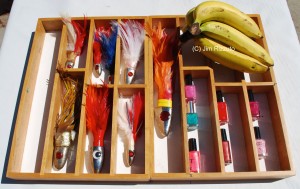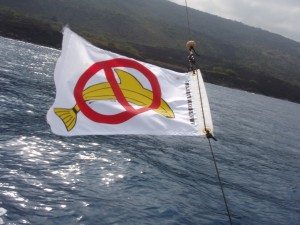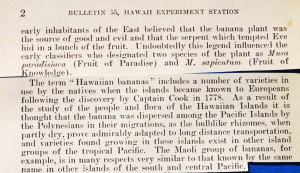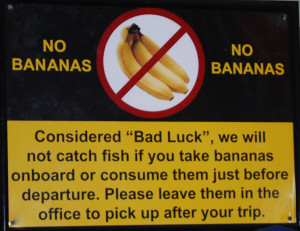I wrote this article for my column on May 29, 2006. Since then it has been pirated by others and either used without attribution or published with someone else’s byline. You can be assured that this is the original, with a few editing changes to update it. It also appeared in The Kona Fishing Chronicles 2006/2007.
 The banana jinx may be the world’s best-known fishing superstition for the world’s worst reason. The jinx has no real claim to authenticity. Yes, you will find all sorts of explanations for its origin and many come with examples of its impact. But could these be merely modern inventions with no basis in prehistoric beliefs?
The banana jinx may be the world’s best-known fishing superstition for the world’s worst reason. The jinx has no real claim to authenticity. Yes, you will find all sorts of explanations for its origin and many come with examples of its impact. But could these be merely modern inventions with no basis in prehistoric beliefs?
Bananas bring bad fishing luck, the saying goes. Don’t you dare bring one aboard my boat in any form! Even banana bread is kapu (you can’t cook the evil out). You’ll hear that from Kona to Madeira and from Florida to Tahiti. Ask the superstitious fisherman where the jinx started and he’ll almost always ascribe it to the Hawaiian fishermen of old.
But did it really start there? And how did the idea get started? The most common explanation for a banana-hex source goes like this. Bananas give off a gas (ethylene) that causes other fruits and vegetables to accelerate their ripening. Back when seafarers went on long voyages and had to carry enough supplies to last the whole trip, they were careful not to pack the aromatic yellow fruit in among their stores. If they did they risked having the other fruits and vegetables ripen prematurely and rot. So they banished bananas from their boats for a good practical reason. By a great leap over a logical chasm, the banana taboo supposedly went from this very real concern on to something rather silly but extremely pervasive.
There is a major problem with this and all other attempts to source the great banana hoax. We have never found a mention of the banana taboo in any fishing literature published prior to 1952 (more about the 1952 reference later). There seems to be no mention of it in any early writings about the beliefs and customs of ancient peoples. Literature about ancient beliefs and rituals abounds, but none of it mentions bananas. Given its firm place in today’s literature, you would certainly expect to find it in classics like Hawaiian Fishing Traditions (a compilation of ancient stories and customs from the 1800’s and before), Native Use of Fish in Hawaii (1952), Sport Fishing in Hawaii (1944), and The Works of the People of Old (based on a series of newspaper articles written in Hawaiian and published during the 1800s).
Fishing friends of my generation and earlier never heard of it. That even includes old-time Hawaii fishermen like Dave Nottage, who says he can’t remember it from way back when. You’d think it might appear in some early interview with folks like skipper Henry Chee, who entered the charter fishing business back in 1935. Not there. (An odd twist: Chee’s father was a banana farmer.)
You don’t even find it in the works of modern writers before the early 1960s. Zane Grey, Kip Farrington, Van Campen Heilner, Joe Brooks — all seem to have lived full fishing lives in far-flung places without ever hearing about it.
In the 1952 publication of Fishing Behind the Eight Ball, by Harlan Major (Stackpole Books) the banana jinx was mentioned for the first time. As the title suggests, the book is an assortment of stories of which many involve odd twists of luck. In that book, Major refers to a 1939 trip to Kona during which he encountered the jinx.
Here’s a quick synopsis of that “discovery.” Major had dinner with a Honolulu attorney at his vacation house in Kona. The unnamed attorney told Major that local fishermen believed bananas brought bad luck. Major seemed incredulous (interesting that he, himself, had never heard of the jinx before). The attorney insisted on an experiment. Major was to go fishing the next day with a local fisherman (also unnamed) and sneak a banana aboard in his gear. He had to do so with great care because, the attorney said, the fisherman would not leave the dock if he knew Major had a banana with him.
Major fished all day, watched others catch fish on other boats, and went the entire trip without a strike.
Things may, in fact, have happened exactly as Harlan Major described them in the book. Or he may have made up the whole story (and maybe even created the banana jinx on the spot?)
As already noted, Eight Ball was published in 1952. That date is significant for two reasons. It does not eliminate the possibility that Major learned about the jinx at some later point up to the time he wrote the book (say 1950 or ‘51) and his account of a pre-1939 incident is fiction. Major did not write about the banana jinx in his earlier books (neither had anyone else, it seems) and it is hard to believe that he could have resisted writing about such a juicy and interesting incident before.
Major does not provide the kinds of details needed to make his incident credible. He does not name either the “prominent Honolulu attorney” who told him about the jinx, or the fishermen he fished with. The latter is particularly significant because both charter captains (Henry Chee and Charlie Finlayson) operating out of “Kailua on the Big Island” were legends. That lapse can’t be attributed to a memory failure because he quotes the attorney word-for-word at length (a 65-word quote). And he does mention George Cherry by name without identifying him (Cherry was manager of the Kona Inn back then, which Major would have known because he did, indeed, come here regardless of whether the banana incident actually happened).
So there may be as much reason to question Major’s account as there is to believe it. But it does establish 1952 as a date (perhaps the first) when the jinx appears in fishing literature.
Don’t overlook this interesting note: in writing the chapter, Major acted like he and the attorney actually believed bananas are bad luck, set up a test, and proved it to their own satisfaction. In other words, they “proved” something that others have proved is not true.
Major, by the way, is perfectly capable of perpetrating a stunt. He was a used-car salesman “back in the day” and is famous in the annals of car selling for a stunt he pulled with an early Ford. (You can look it up.)
You would think the banana jinx was too juicy a matter to have escaped the attention of local historians and writers, yet I can’t find any local reference to the banana jinx before the 1952 reference. Then again, maybe it is there in local literature way back when and I never saw it.
Try it for yourself. Can you “document” an earlier life for this jinx? Documenting means finding a printed reference to it earlier than 1952.
If the importance of a dated reference isn’t already clear and obvious, consider this example. Remember the ethylene gas explanation for the origin of the kapu? The earliest reference I can find for that is a piece written in 1972. That earliest known piece of literature is something I wrote. And at that time, I invented the connection between the gas and the fishing kapu as an April Fool’s joke, never thinking anyone would ever take it seriously because it was so far-fetched. Yes, the gas from bananas, apples and certain other fruit will ripen other items stocked with it, but what does that have to do with fishing luck? And you know Polynesians did take bananas with them wherever they went because bananas are established everywhere they went. That didn’t happen by accident. Bananas require human propagation.

Do you think I am now lying about being the original source? I might be. The only way you can prove it is to find a pre-1972 source written by someone else for the connection with the jinx.
Don’t be surprised if you discover a non-Polynesian origin for the banana jinx, which was proposed by Dr. Hans Pfenninger, an IGFA representative who lives in Herrliberg, Switzerland. The good doctor wrote me in 2003 after reading an article I had written about superstitions. In his worldwide search for billfish, Pfenninger says he was confronted everywhere by the banana jinx. “In Senegal, for example, a very old deckhand told me, that already his grandfather would never permit bananas being on board,” Pfenninger wrote, “I heard the same from an old Mexican in Baja.”
Pfenninger asked publicly about the origin in a letter to the editor of Marlin magazine and received replies pointing to sources very far away.
A San Diego writer said the superstition arrived in San Diego in the early 1900s with the large numbers of Portuguese fishermen who came there back then. (To which I say “show me the document.” In other words, find an early 1900’s article that mentions the jinx.)
A Delaware writer said the superstition came from turn-of the-century ships sailing from South America loaded with bananas. “Boats would often be overloaded and the shifting cargo would sometimes sink the ship — hence the name ‘banana boat’ and the bad-luck jinx.” (Again, show me a turn-of-the-century document about the jinx and South American banana boats.)
David Finkelstein of New York took it all the way back to Capt. James Cook and the mid-18th century discovery that scurvy could be prevented by provisioning ships with enough fruit to last through the longest voyage. Finkelstein takes us back to the old bananas-rot-the-rest-of-the-cargo theory and the logical leap from boating to fishing.
Kona skipper Dale Leverone says it has nothing to do with the bananas themselves, but bunches of bananas host those ugly, furry critters known as banana spiders. They look like tarantulas and would scare anyone away from bananas regardless of what effect they might have on fishing.

Over the past year, we here in Hawaii have seen another logical leap, compliments of a TV commercial aired during 2006. The commercial follows some local boys on a fishing expedition. A shore-fishing expedition. In one quick cut, a shore fisherman is reeling in his no-luck line as the camera shows a banana peel hanging from his backpack. An obvious reference to the banana jinx, it proves that the jinx has leaped a chasm and come ashore.
The jinx is mutating right in front of us. Not only do we not know where the kapu came from, who knows where it will leap next?
But just because bananas aren’t really bad luck doesn’t mean all things aren’t.
If you aren’t catching when others are, perhaps you were just holding your mouth wrong? I used to fish with a guy who blamed bad luck on the way you hold your mouth. Try that with your fishing buddies. Next time you have bad luck tell them they need to change the set of their jaw, the line of their lips, the tilt of their head, etc. It may not be good for catching fish, but it’s worth a lot of laughs when you see their contorted expressions.
Or maybe there was discord at home during the stretch of bad luck. Hawaiians blamed bad luck on family strife and admonished their wives to keep the home front harmonious while they were fishing.
They also believed that you should avoid talking about fishing while you were making your preparations. Fish have ears and can be forewarned by your words. It may be your conversation on the way to the boat was too fishy and it alerted the fish. After a few hours of bad fishing, the fish then realized they had nothing to fear from you, were lulled into a false sense of security, and grabbed your lures unawares.
Was anyone in your party bald? Baldness was very unusual among the early Hawaiians and they believed that bald fishermen were lucky. That proved to be unlucky for the bald guy because the luck was supposedly in the fisherman’s bones. Remember that Pacific Islanders made their hooks from bones and human shinbones were particularly prized. A lucky bald fisherman had reason to fear for his life.
You might want to add one or more bald fishing companions to your fishing trips. But only if they agree to will you their shin bones.
Perhaps Polynesian superstitions really aren’t pertinent to your situation. Italian fishermen believe there is special magic in beads. I’m guessing it is the whole rosary thing – kind of an undersea prayer. Italian fishermen from the homeland (I’m Calabrese – check out Capo Isola Rizzuto on the internet) always add beads to their rigs. For many years, the only ready-made rigs available for bottom fishing in New England and the Mid-Atlantic states were festooned with red beads, compliments of Italian fishing tradition.
New Zealanders rig with floating beads but that doesn’t really count. Those beads serve a practical purpose (holding the bait up off the bottom) and there is nothing practical about superstitions.
Superstitions seem to be specific to the fisherman. I’ve noticed that many fishermen seem to attach their luck to a particular article of clothing – say, a lucky fishing shirt, pair of pants, jacket, hat, shoes, socks, etc. These fishermen should be avoided because they usually believe that the luck washes away. Unfortunately, the luck is not in the smell, which can be considerable.
Often, the luck is in some routine that must be repeated exactly as done on the day when the fisherman discovered the magic by having a particularly good fishing day. If this happens to you, be sure to write it down so you don’t forget it between seasons and trips.
The banana jinx appears to be like that. Capt. Billy Dorr ate a banana and took bananas with him on the day he caught his biggest blue marlin, a 960-pounder. Capt. Gus Sellers had bananas along on the day when he won his biggest tournament $$$ payout. These are two among many fishermen who feel they must bring bananas to insure their best catches and pack them in their gear every day.
Penn Jillette, the magician, says that luck is “probability taken personally.” In this case, it seems like the banana is the personification for folks who believe they are, or are not, lucky. It sure beats having skill, correctly using the right equipment, and being in the right place at the right time.
For years, Pacific fishermen believed that marlin bite best during the week of the new moon. That’s because they can’t feed at night during that dark phase. Commercial longliners have proved that marlin seldom, if ever, feed at night even when the moon is full. Sport Fishing magazine recently published the results of a study showing there is no difference in billfish catch per unit effort from one moon phase to another. But fishermen still schedule their fishing by moon phases – swearing on the dark of the moon in the Pacific and the full moon in the Atlantic. The theory continues as a superstition long after it has failed as fact.
I believe that IGFA could boost membership and do its members a service by compiling a list of all of the fishing superstitions in the world both now and back through history. IGFA could come up with such a list simply by calling on its members. The list could be kept secret and made available only to dues-paying members. Anglers would flock to membership in the IGFA, though they would, of course, have to be sworn to secrecy.
That way we would all be sure to keep our mouths set right, adorn our rigs with beads, preach accord at home, avoid warning the fish with the wrong kind of pre-trip conversation, be kind to bald people, etc. (the list would be long and get longer by the day) – and not fail to avoid bananas or bring them along according to what seems to work when we are at the right place at the right time with the right gear.
By the way, banana luck could not have originated in Hawaii. Bananas are native to the Orient and did not reach Polynesia until well after Hawaiians and others had already established their fishing practices and superstitions. Lord knows the original Polynesian explorers would not have packed them in their stores when they set out to discover new places. All that ethylene gas, you know.